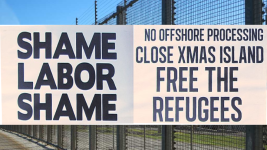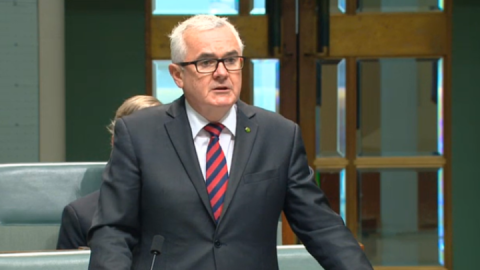“A Crime Against Humanity”: Independent MP Andrew Wilkie on Ending Mandatory Detention

The staggered release of the Medevac refugees from long-term detention in hotels scattered across the nation, which began in December 2020 and came to a close right before this year’s election, brought a lengthy campaign to see them out and living in the community to an end.
But as federal Independent MP Andrew Wilkie is at pains to point out, this recent victory and others like it, such as the government finally agreeing to New Zealand’s offer to take in hundreds of refugees currently in Australia, haven’t marked the end of the brutal Sovereign Borders regime.
That’s why the Independent member for Clarke has reintroduced his Ending Indefinite and Arbitrary Immigration Detention Bill 2022, which seeks to do exactly what its title suggests, end mandatory detention: a federal policy that was first adopted back in 1992.
As Wilke put it in his second reading speech, “This bill is needed, and frankly it’s needed urgently, because we face the bizarre and outrageous situation in this country where someone, in some circumstances, can be detained indefinitely, without charge and without having been found guilty of anything.”
Clarifying indefinite detention
Indeed, it was only last year that the Morrison government passed legislation clarifying that our nation can indefinitely detain refugees and asylum seekers in circumstances where they can’t be returned to their countries of origin due to likely danger, or because of their statelessness.
Currently, there are around 130 people who’ve been locked up in our onshore immigration detention centres for over five years. And it was the release of one of these long-term detainees that saw former immigration minister Andrew Hawke scrambling to patch up migration laws.
In a ruling that reflects just how embedded the idea of locking up fleeing foreigners without end has become within our system, the majority of the High Court found in June 2021 that the executive branch of government can incarcerate “unlawful noncitizens” unable to be returned without end.
And despite the number of long-term detainees on the island now amounting to a little over one hundred, then home affairs minister Karen Andrews, shadowed by Scott Morrison at the time, determined to maintain the Australian immigration detention regime in Nauru last September.
A new hope?
With the demise of the Morrison government this year and the coming of PM Anthony Albanese, refugee advocates had hoped a change on this front was coming. However, this was dashed when some of the Labor government’s first actions in office were to turn back refugee boats.
Foreign affairs minister Penny Wong went on to confirm in June that the Nauru regime would be kept in place, while Albanese has just handed over the contract to run detention operations on the island over to US-based private prison operator MTC.
Sydney Criminal Lawyers spoke to Independent MP Andrew Wilkie about the continued need to dismantle the mandatory detention regime, the human toll it’s taking, and how successive Australian governments have destroyed the nation’s human rights standing in the process.
In the second week of the new parliament, you reintroduced legislation that’s designed to end the mandatory detention of asylum seekers arriving in Australian waters by boat.
Andrew, over the last five years, there have been changes to the way in which the nation’s immigration detention regime is operating. How would you describe the state of it today?
I don’t believe it has changed much. We still have the same regulatory framework in place, and it still is, in large part, supported by both major parties.
So, although there are less people in detention, there are still people in detention, and we still need to champion reform of that framework.
It’s disappointing that it’s not as clearly on the radar for some people and hence, the importance of a bill like this to educate people and push for reform.
In March this year, there were 1,512 people being held in immigration detention in Australia. There were a further 563 living in community detention.
There were almost 11,000 so-called illegal maritime arrivals on bridging visas, so they haven’t been given any permanency. And there are still about 200 asylum seekers in offshore detention.
So, the problem hasn’t gone away.
How does the Ending Indefinite and Arbitrary Immigration Detention Bill seek to change the way the immigration regime is operating in terms of mandatory detention?
It effectively abolishes unlawful mandatory detention. It provides that community alternatives to detention will always be preferred to detention, where possible.
It ensures that those in the alternatives to detention – so they’re in the community – have full access to housing, financial support and have the right to work.
Further, they can access education, healthcare and other government services, which to my mind is not only sensible and ethical, but it would also bring Australia into line with international law.
It also explicitly lists the specific conditions in which a person can be detained.
It sets time limits. It sets a time limit so a noncitizen must not be kept in immigration detention for more than 3 months, and it can only be extended to 12 months in extraordinary circumstances.
It allows for independent oversight and proper review of detention. And it complies with international law.
The highlights are the very narrow reasons for detention and the time limits on detention.
So, what would happen to the over 130 people who’ve currently been in immigration detention for over 5 years?
The government would need to find an alternative to their detention. It is just unconscionable that anyone would be kept inside that long.
The average time that people are held in detention – and this is the average not those extreme cases you’re saying – is 700 days.
There are some people who have been on Nauru for over 9 years, including some who have been found to be refugees.
There is simply no justification for that. They should be released into the community.
You first introduced this bill under the Morrison government, which, just last year, passed legislation clarifying that the executive could detain unlawful noncitizens indefinitely.
Do you expect under the Albanese government, with the notable difference in the makeup of the current parliament, there will be more of a willingness to consider the laws you’re proposing?
I lament the fact that the bill passed by the Morrison government, which allows the government to detain someone in immigration detention indefinitely, was supported by the Labor Party.
I was one of very few people who voted against it. That was one of the most shocking bills that I’ve seen in my 12 years in parliament, and it didn’t get a lot of attention.
The government and opposition voted together to allow for a noncitizen, who for whatever reason can’t be returned to their country of origin, to be detained in Australia in gaol-like conditions for the rest of their life.
That is unconscionable, and it is entirely at odds with international law. It’s now legal under Australian law, and again, Australian law is completely at odds with international law.
You’ve pointed out that detaining an individual in onshore detention costs the taxpayer $360,000 a year, while if an asylum seeker is placed in a hotel, this takes it up to $460,000.
But further than the monetary costs, there’s a human toll and an impact on our nation. Can you speak on this?
The financial costs pales in comparison to the cost to individuals’ mental, physical and emotional health. This is a form of torture, quite frankly.
Keeping someone locked up in a hotel room for years may not meet the strict definition of torture, but I would call it a form of torture and that human toll is the most important dimension of this by far.
With my bill, I singled out the financial cost because people need to be aware of that, and regrettably, for some people, that’s what they care about.
There are some Australians who don’t care about the personal cost. But I hope I can turn them around by educating them about the financial cost.
Of course, the other cost is to Australia’s standing in the world. In the eyes of many nations around the world, we are a pariah on this issue.
We are a cruel country at odds with international law when it comes to irregular immigration.
Our reputation globally is significantly diminished by these policies.
And lastly, Andrew, aside from the brutal human cost of this regime, your bill stresses that our government is operating outside of its international obligations under the 1951 Refugee Convention.
Why should a nation like Australia be upholding international law rather than finding ways to skirt around it?
We should be doing things differently because, first and foremost, we should act ethically.
We should act as a country with real integrity. And we are not when we behave this way. We are not acting with integrity.
We are also not acting as a country that is just so damn lucky. We are one of the richest countries in the world.
We’re the twelfth biggest economy. By some measure of per capita wealth, we are the first or second wealthiest people on the planet.
We’re heavy with natural resources, knowhow and human capital. We don’t have a right to just hoard that for ourselves.
We should share our good fortune, and we should be a much more significant host of people from around the world who are fleeing horrid conditions, and we should always act to honour our international agreements.
As you know, we are signatories to numerous international agreements. Agreements that we signed up to in good faith. And now we’re treating them with contempt.
We treat the Refugee Convention with contempt. We treat the Rome Statute with contempt.
It’s a crime against humanity, under the Rome Statute, which we’ve signed up to, to keep someone in indefinite detention without trial, and that’s exactly what we are doing.
It’s a crime against humanity under the Rome Statute to send somebody to a third country and lock them up there without trial like we do on Nauru.
Now they’re not locked up on Nauru, strictly speaking. But in all practical other ways, they’re prisoners on Nauru.
It’s more than a cliche that this is a black mark in the history books. It’s so true of our response to asylum seekers.
I’m not just picking on the previous government. I will go right back to the Labor government that invented mandatory detention.
Both major parties have really dirty hands when it comes to asylum seekers.








